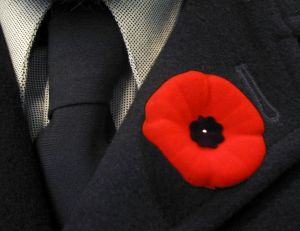
Remembrance Day ought to remind the Canadian state of its responsibility to veterans of military conflicts. flickr/hobvias sudoneighm
As Remembrance Day approaches, we are reminded of the pivotal moments in Canada’s military history.
The armistice ending World War I fell on the eleventh hour of the eleventh day of the eleventh month, in 1918. At the time, many considered the First World War “a war to end all wars”, a collision of European and Near Eastern empires, impelled to horrific heights by the advent of technologies of death and destruction unprecedented in the history of warfare. Shortly thereafter, the League of Nations was established in the interest of preventing another world war. Sadly, we know with what result.
War was a defining feature of the twentieth century, as empires emerged and receded, and increasingly militarized states dueled one another for access to lands, resources, and spheres of influence. Since what was then termed “The Great War”, Canadian soldiers have fought in seven major conflicts: The Spanish Civil War, World War II, the Korean War, the Gulf War, the Yugoslav Wars, Somalia, and Afghanistan. Our country’s military has also provided material and logistical support on numerous occasions to other governments and NATO forces as they were involved in foreign conflagrations, including, recently, Libya and Mali.
Though there is room for disagreement as to the necessity of Canada’s involvement in most of the aforementioned engagements (and I would argue that just solutions to conflicts are seldom found in violence), there is one point which ought to be free of controversy: that wounded and disabled Canadian veterans deserve respectful, dignified treatment from the Canadian government.
No social responsibility?
However, as Canadian comedic icon Rick Mercer pointed out in a recent rant, ever since the passage of the new Veterans’ Charter in 2006 (on legislation introduced by Paul Martin’s Liberal government), many disabled veterans are exposed to loss of pension and benefits as they age. Humorously, Mercer compared the pension eligibility of veterans to that of parliamentarians, noting that legislators on Capital Hill seem adept at looking out for number one. However, the fact that wounded and disabled Canadian veterans are being short-changed, and that the Harper government’s lawyers had the temerity to argue the federal administration has “no social responsibility” for those veterans, is no laughing matter.
To make matters worse, in September, the Ottawa Citizen reported that the Canadian Forces had requested that wounded veterans sign a form, pledging not to criticize Canadian Forces leadership or officials on social media, so as to avoid discouraging future Forces applicants. Some veterans have elected to speak out anyway, including Corporal Glen Kirkland, who has claimed he was threatened with dishonourable discharge for raising his concerns.
All this points to more than just a public relations problem for the Harper government; it also indicates a lack of genuine concern for the welfare of Canada’s disabled veterans and their families, and a paucity of regard for justice. But beyond this, it is also a poor strategic decision; after all, Canada’s military owes its survival and continuity to its ability to enlist new recruits, and the prospect of finding oneself injured in battle overseas, and then receiving the financial shaft from one’s own government upon returning home, hardly seems enticing…
If our government, or any other, is concerned with controlling military costs, I would suggest that its emphasis ought to be on avoiding, defusing, preventing, and generally staying out of armed conflicts, and not on systematically chiseling away at the pensions and benefits of individuals who have made extraordinary sacrifices on behalf of their country.